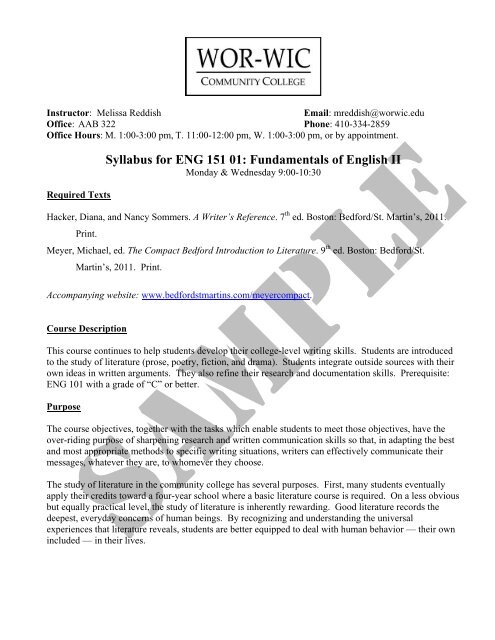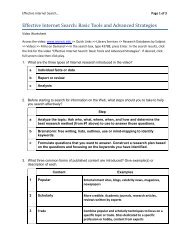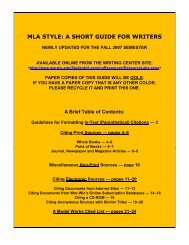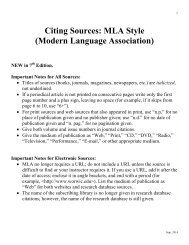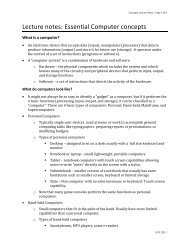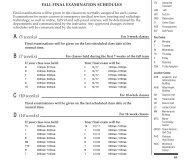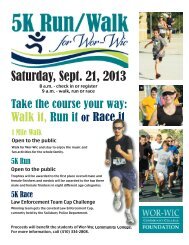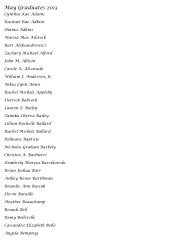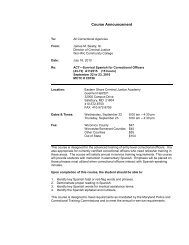Syllabus for ENG 151 01 - Wor-Wic Community College
Syllabus for ENG 151 01 - Wor-Wic Community College
Syllabus for ENG 151 01 - Wor-Wic Community College
Create successful ePaper yourself
Turn your PDF publications into a flip-book with our unique Google optimized e-Paper software.
Instructor: Melissa Reddish Email: mreddish@worwic.edu<br />
Office: AAB 322 Phone: 410-334-2859<br />
Office Hours: M. 1:00-3:00 pm, T. 11:00-12:00 pm, W. 1:00-3:00 pm, or by appointment.<br />
Required Texts<br />
<strong>Syllabus</strong> <strong>for</strong> <strong>ENG</strong> <strong>151</strong> <strong>01</strong>: Fundamentals of English II<br />
Monday & Wednesday 9:00-10:30<br />
Hacker, Diana, and Nancy Sommers. A Writer’s Reference. 7 th ed. Boston: Bed<strong>for</strong>d/St. Martin’s, 2<strong>01</strong>1.<br />
Print.<br />
Meyer, Michael, ed. The Compact Bed<strong>for</strong>d Introduction to Literature. 9 th ed. Boston: Bed<strong>for</strong>d/St.<br />
Martin’s, 2<strong>01</strong>1. Print.<br />
Accompanying website: www.bed<strong>for</strong>dstmartins.com/meyercompact.<br />
Course Description<br />
This course continues to help students develop their college-level writing skills. Students are introduced<br />
to the study of literature (prose, poetry, fiction, and drama). Students integrate outside sources with their<br />
own ideas in written arguments. They also refine their research and documentation skills. Prerequisite:<br />
<strong>ENG</strong> 1<strong>01</strong> with a grade of “C” or better.<br />
Purpose<br />
The course objectives, together with the tasks which enable students to meet those objectives, have the<br />
over-riding purpose of sharpening research and written communication skills so that, in adapting the best<br />
and most appropriate methods to specific writing situations, writers can effectively communicate their<br />
messages, whatever they are, to whomever they choose.<br />
SAMPLE<br />
The study of literature in the community college has several purposes. First, many students eventually<br />
apply their credits toward a four-year school where a basic literature course is required. On a less obvious<br />
but equally practical level, the study of literature is inherently rewarding. Good literature records the<br />
deepest, everyday concerns of human beings. By recognizing and understanding the universal<br />
experiences that literature reveals, students are better equipped to deal with human behavior — their own<br />
included — in their lives.
Objectives, Assessment Goals, and Assessment Strategies:<br />
Objectives: Upon completion of this<br />
course, students should be able to<br />
1. Differentiate among literary works in<br />
a variety of genres and modes. (GEOs<br />
1, 2, 3, 5)<br />
Objectives: Upon completion of this<br />
course, students should be able to<br />
2. Employ and interpret the elements<br />
and structures of various literary genres<br />
and modes. (GEOs 1, 2, 3, 5, 7)<br />
3. Present effective written arguments<br />
about literature. (GEOs 1, 2, 3, 5, 7, 8)<br />
4. Employ MLA style documentation<br />
ethically and correctly. (GEOs 1, 2, 3, 7,<br />
8)<br />
Assessment Goals Assessment Strategies<br />
A. Identify and discuss the literary<br />
elements (plot structure, characterization,<br />
setting, point of view, style, and theme)<br />
present in assigned literary works.<br />
B. Demonstrate the ability to actively and<br />
critically read various examples of short<br />
fiction, drama, poetry and non-fiction.<br />
C. Analyze various examples of short<br />
fiction, drama, poetry and non-fiction.<br />
<strong>ENG</strong> <strong>151</strong>, Page 2<br />
Class Discussion, Reflective Responses<br />
“Did You Read It?” Quizzes<br />
Assigned Essays and Final Exam<br />
Assessment Goals Assessment Strategies<br />
A. Define and recognize literary terms<br />
(see attachment).<br />
B. Indicate literary elements and terms<br />
when discussing and writing about short<br />
fiction, drama, poetry, and non-fiction.<br />
C. Apply literary terminology when<br />
reading, critically analyzing, discussing,<br />
and writing about works of short fiction,<br />
drama, poetry, and non-fiction.<br />
A. Locate and sufficiently incorporate<br />
one or more relevant sources—one of<br />
which must be electronically retrieved—<br />
to support an essay documented in MLA<br />
Style.<br />
B. Demonstrate the writing process<br />
when planning, drafting, revising, and<br />
editing written compositions of various<br />
lengths.<br />
C. Differentiate among the levels of<br />
literary analysis (<strong>for</strong> example, “overview”<br />
and review as opposed to literary<br />
criticism).<br />
D. Collect and organize appropriate<br />
sources in order to develop effective<br />
arguments about literature.<br />
A. Demonstrate the ability to quote,<br />
paraphrase, summarize, and cite all<br />
sources accurately.<br />
“Did You Read It?” Quizzes, Literary<br />
Terms Quizzes<br />
“Did You Read It?” Quizzes, Literary<br />
Terms Quizzes, Reflective Responses,<br />
Assigned Essays<br />
Reflective Responses, Assigned<br />
Essays, Final Exam<br />
Assigned Essays<br />
Assigned Essays, Final Exam<br />
Assigned Essays, Reflective Responses<br />
Assigned Essays, Reflective Responses<br />
Assigned Essays, Final Exam<br />
SAMPLE<br />
B. Employ the correct MLA <strong>for</strong>mat <strong>for</strong><br />
both in-text citations and <strong>Wor</strong>ks Cited<br />
entries.<br />
Assigned Essays, Final Exam
Class Guidelines<br />
<strong>ENG</strong> <strong>151</strong>, Page 3<br />
1. COURSE WORK, DEADLINES, AND LATE WORK:<br />
All assignments described in this syllabus will be discussed further in class and are expected to be<br />
complete by the stated deadline. It is the student’s responsibility to understand the assignments<br />
be<strong>for</strong>e leaving class, so if you are experiencing difficulty with any assignment, please speak to me<br />
immediately <strong>for</strong> clarification and/or assistance.<br />
� There will be no make-up quizzes or classwork.<br />
� Essays submitted late will be deducted one letter grade. Essays will be accepted a<br />
maximum of one week after the original due date. All other late work will be accepted <strong>for</strong><br />
half credit one class period after the due date.<br />
2. ATTENDANCE:<br />
Classroom interaction is crucial if we are to meet the objectives of this course; there<strong>for</strong>e,<br />
attendance will be taken every class, and students are expected to attend every class.<br />
Please note: students are expected to arrive on time and to stay <strong>for</strong> the entire class period.<br />
Personal appointments should be scheduled at times other than class meetings. Students may miss<br />
three class periods; after that, each class period missed will equal a 10% deduction in points from<br />
Classwork/Discussion.<br />
3. CORE ASSIGNMENTS:<br />
3A. Each student will write a series of Reflective Responses on the literary works we cover in the<br />
Course Schedule. These responses will be collected at the beginning of the class sessions<br />
specified in the Course Schedule.<br />
3B. Each student must complete all Prewriting Exercises to document his/her understanding of the<br />
research process. Each student will then submit Three Documented Essays properly <strong>for</strong>matted and<br />
documented in MLA Style.<br />
3C. A series of “Did You Read It?” Quizzes will be given over the course of the semester. It is crucial<br />
to thoughtfully and critically internalize the assigned readings to successfully complete each quiz.<br />
3D. There will be a series of three Literary Terms Quizzes on key vocabulary and literary concepts.<br />
3E. There will be a cumulative Final Examination covering the main literary terms and concepts<br />
introduced throughout the course.<br />
4. DRAFTS AND MLA FORMAT:<br />
SAMPLE<br />
All submissions <strong>for</strong> this class, with the exception of in-class exercises must be typewritten or<br />
word-processed. Computers and printers are available at <strong>Wor</strong>-<strong>Wic</strong>'s Open Computer Lab, MTC<br />
200. If you need additional help on any writing assignment, please contact me via email well<br />
be<strong>for</strong>e the assignment is due. All written submissions must follow MLA <strong>for</strong>mat.
5. GRADING: FINAL GRADES WILL BE COMPUTED AS FOLLOWS:<br />
9% Three Reflective Responses (3 x 30 points each) 90 points<br />
9% Three Prewriting Exercises (3 x 30 points each) 90 points<br />
1% Letter of Introduction (1-2 pages) 10 points<br />
15% Essay #1: Poetry (3 pages) 150 points<br />
15% Essay #2: Fiction (4 pages) 150 points<br />
15% Essay #3: Drama (3 pages) 150 points<br />
10% “Did You Read It?” Quizzes (10 x 10 points each) 100 points<br />
2% Literary Terms Quiz #1: Fiction 20 points<br />
2% Literary Terms Quiz #2: Poetry 20 points<br />
2% Literary Terms Quiz #3: Drama 20 points<br />
10% Classwork/Discussion 100 points<br />
10% Final Literature Exam 100 points<br />
100% 1000 points<br />
<strong>ENG</strong> <strong>151</strong>, Page 4<br />
USING A POINT SYSTEM, ALL GRADES WILL BE COMPUTED BY DIVIDING THE TOTAL POINTS EARNED BY THE<br />
TOTAL AMOUNT POSSIBLE (1000). THE BASIC SCALE IS AS FOLLOWS:<br />
A = 90% – 100%<br />
B = 80% – 89%<br />
C = 70% – 79%<br />
D = 60% – 69%<br />
F = below 60%<br />
6. ACADEMIC HONESTY:<br />
Academic Honesty Policy<br />
Academic honesty is expected of all students. Cheating and plagiarism are violations of academic<br />
honesty. Any student who has violated the academic honesty policy will be denied credit <strong>for</strong> the<br />
assignment, and then the matter will be turned over to the Student-Faculty Disciplinary Committee.<br />
Documented evidence of the offense will be kept in the Arts and Humanities Department office.<br />
Plagiarism: In both oral and written communication, the following guidelines <strong>for</strong> avoiding plagiarism<br />
must be followed:<br />
1) Any words quoted directly from a source must be in quotation marks (<strong>for</strong> a written<br />
communication) and cited.<br />
2) Any paraphrasing or rephrasing of the words and\or ideas of a source must be cited.<br />
3) Any ideas or examples derived from a source that are not in the public domain or of general<br />
knowledge must be cited.<br />
4) All papers and presentations must be the student's own work.<br />
SAMPLE<br />
Students who are confused about what constitutes plagiarism should meet with their instructor.<br />
Cheating: Cheating is the act of obtaining in<strong>for</strong>mation or data improperly or by dishonest or deceitful<br />
means. Examples of cheating include copying from another student's test paper, obtaining in<strong>for</strong>mation<br />
illegally on tests, and using unauthorized electronic devices.
<strong>ENG</strong> <strong>151</strong>, Page 5<br />
Student Conduct Statement (as found in the college catalog):<br />
“In addition to following other student conduct regulations, all students are expected to exhibit<br />
appropriate classroom behavior. In order to adhere to the guidelines <strong>for</strong> civility in the classroom, students<br />
should:<br />
1) Turn off all electronic devices be<strong>for</strong>e coming to class (students who are required to be on call or who<br />
could be in a potential emergency situation should clear the use of any electronic device with their<br />
instructor be<strong>for</strong>e class);<br />
2) Arrive to class on time and avoid leaving early;<br />
3) Remain attentive throughout the entire class session;<br />
4) Listen actively and avoid side conversations while the instructor or another student is presenting<br />
in<strong>for</strong>mation;<br />
5) Demonstrate a respectful attitude toward the instructor and other students during discussion or debate;<br />
6) See their instructor during office hours instead of during class time if they need clarification of course<br />
material missed due to absence;<br />
7) Consume food in the classroom only with permission of the instructor; and<br />
8) Leave a clean environment <strong>for</strong> the next class.”<br />
7. EMERGENCY PREPARADNESS STATEMENT:<br />
In the event of a flu epidemic or other emergency that results in the suspension of classes, faculty will be<br />
communicating with students about their courses and course requirements, such as assignments, quiz and<br />
exam dates, and class and grading policies, via faculty websites or Blackboard. Students will be<br />
responsible <strong>for</strong> completing all these assignments in accordance with class policies. In<strong>for</strong>mation about the<br />
resumption of classes will be communicated via the <strong>College</strong>'s website and email system.<br />
8. WRITING CONFERENCES:<br />
If you wish to have additional help on an essay, you may schedule an appointment with a writing<br />
conference instructor by going to www.worwic.edu and clicking on Learning Resources under Quick<br />
Links. From there, scroll down to Writing Conferences and follow the directions to make an<br />
appointment. Limited time slots are available, so an appointment is required.<br />
Monday 3:00-6:00<br />
Wednesday 11:00-2:00<br />
Tuesday 3:00-6:00<br />
SAMPLE<br />
9. USE OF COLLEGE FACILITIES STATEMENT:<br />
Please be aware that only currently enrolled college students, employees, and officially invited college<br />
guests are permitted in college classrooms and laboratories while classes and other educational activities<br />
are being conducted. It is inappropriate to bring nonenrolled persons, of any age, to college classes and<br />
laboratory activities. Children who are brought to the college while parents are on official business may<br />
not be left unattended in college facilities. This practice is unsafe and detrimental to the well-being of the<br />
children. It is expected that all students and employees will comply with this policy.
<strong>ENG</strong> <strong>151</strong> Literary Terms<br />
<strong>ENG</strong> <strong>151</strong>, Page 6<br />
The following literary terms are discussed and defined in our core text, The Bed<strong>for</strong>d Introduction to Literature, as<br />
well as on its companion website: www.bed<strong>for</strong>dstmartins.com/meyercompact. We will also discuss these terms<br />
throughout the course of the semester. While this list is by no means exhaustive, it includes most of the critical<br />
vocabulary necessary to succeed in this course.<br />
Form/Genre/Type Character<br />
Ballad Antagonist<br />
Closed Form Dynamic Character<br />
Comedy Flat Character<br />
Couplet Foil<br />
Fable Protagonist<br />
Lyric Round Character<br />
Open Form Static Character<br />
Sonnet Stereotype<br />
Tragedy Tragic Flaw (Hamartia)<br />
Tragicomedy Tragic Hero<br />
Plot and Structure Style/Tone/Figurative Language<br />
Climax Allusion (Biblical, historical, literary, and<br />
Situation (vs. Plot)<br />
mythological)<br />
Conflict Catharsis<br />
Exposition Connotation<br />
Flashback Denotation<br />
Foreshadowing Dialogue vs. Monologue<br />
Octave and Sestet Diction<br />
Quatrain Hyperbole<br />
Resolution/Dénouement Image/Imagery<br />
Rhyme Scheme Irony (verbal, situational, dramatic)<br />
Stanza<br />
Prosody: Sound, Rhythm, Rhyme<br />
Alliteration<br />
Assonance<br />
Metaphor<br />
Onomatopoeia<br />
Personification<br />
Simile<br />
Stage Directions<br />
Symbol/Symbolism (conventional and literary)<br />
Couplet Point of View/Speaker<br />
Enjambment (vs. end-stopped line) Point of View (1 st person, 2 nd person, 3 rd person)<br />
Foot Narrator (vs. Speaker)<br />
Meter Speaker (vs. Narrator)<br />
Stress (rhythm, beat, accent) Omniscient Narrator<br />
Limited Omniscient Narrator<br />
Unreliable Narrator<br />
Setting Naïve Narrator<br />
Cultural Environment (Milieu)<br />
Physical Setting (place)<br />
Temporal Setting (time) Theme (vs. Thematic Category or Subject)<br />
SAMPLE
Reflective Response Guidelines<br />
<strong>ENG</strong> <strong>151</strong>, Page 7<br />
The following guidelines should be used <strong>for</strong> all of your Reflective Response assignments. You will write<br />
three Reflective Responses worth 30 points each.<br />
General Instructions:<br />
Read the relevant literary works as assigned on the course schedule. Then, choose one question to answer<br />
fully in a 1 ½ page short essay. Your goal is to create a single, well-crafted reflection on the assigned<br />
question. If the question contains multiple parts, use transitions to shift gracefully from one idea to the<br />
next.<br />
Each Reflective Response should contain a specific, arguable thesis statement in your first paragraph.<br />
This thesis statement should explain the main idea of your essay, which should be related to the question<br />
asked on the response sheet. You will need to develop your thesis with body paragraphs that contain<br />
specific evidence and analysis.<br />
You will also need to integrate quotations gracefully into your own sentences, so use these Reflective<br />
Responses to practice incorporating quotations in new and different ways.<br />
Format:<br />
� Begin each response with the four-line MLA heading. Center your title and be sure to include a<br />
header.<br />
� Each response should be typed and double-spaced. Use Times New Roman, 12 point font.<br />
� Try to identify the title and author of the work you are responding to in the first few sentences of<br />
your response.<br />
Citations:<br />
� All responses must contain in-text (parenthetical) citations.<br />
� Cite a short story by its author and the page number from out textbook, a poem by its poet and<br />
line number(s), and a play by its playwright and then the act, scene, and speech (or line) number.<br />
� No <strong>Wor</strong>ks Cited page is required.<br />
� No outside sources are required.<br />
Due Date:<br />
� All Reflective Response essays are due at the beginning of each class on the date assigned. You<br />
can find individual due dates on the course schedule.<br />
� Late essays will be accepted <strong>for</strong> half credit.<br />
SAMPLE<br />
Several examples of student responses are located throughout your textbook.
Course Schedule<br />
<strong>ENG</strong> <strong>151</strong>, Page 8<br />
You are expected to have all of the assignments listed <strong>for</strong> a given class completed on that date. This schedule is<br />
subject to change.<br />
All readings are from your Bed<strong>for</strong>d Introduction to Literature unless otherwise noted.<br />
Date Reading Due Writing Due<br />
September 7 – Introduction to Poetry<br />
“Introduction to Poetry” p. 570<br />
“Secretary Chant” p. 550<br />
September 12 – Poems of Experience: <strong>Wor</strong>k<br />
September 14 – Poems of Experience: Family<br />
“Chimney Sweeper” p. 704<br />
“Restaurant” (handout)<br />
“Hazel Tells LaVerne” p.608<br />
Letter of Introduction Due<br />
“Alzheimer’s” p. 792<br />
“Those Winter Sundays” p. 551<br />
“My Papa’s Waltz” p. 754<br />
September 19—Poems of Experience: Love and Emotion<br />
September 21 – Poems of Experience: Death<br />
September 26 – Poems of Experience: War<br />
“Shall I compare thee” p. 762<br />
“since feeling is first” p. 978<br />
“Memorandum” p. 982<br />
Reflective Response #1 Due<br />
“Death Fugue” (handout)<br />
“Do Not Go Gentle” p. 768<br />
“Death Be Not Proud” p. 808<br />
Bring in poem <strong>for</strong> Essay 1<br />
SAMPLE<br />
“Charge of the Light Brigade” p. 752<br />
“Dulce Est Decorum Est” p. 649<br />
“AD” p. 688<br />
Pre‐Writing Due (Essay 1)<br />
“next to of course god america I” p. 689<br />
September 28 – Life in America: Race and Ethnicity<br />
“The <strong>Community</strong> <strong>College</strong> Revises” p. 991<br />
“Mexicans Begin Jogging” p. 993<br />
“Legal Alien” Crossing Boundaries inset E
Date Reading Due Writing Due<br />
October 3 – Case Study: Langston Hughes<br />
“I, Too” p. 907 Literary Terms Quiz #1<br />
“Negro Speaks of Rivers” p. 904<br />
“Song <strong>for</strong> a Dark Girl” p. 911<br />
“Lenox Avenue: Midnight” p. 911<br />
October 5 – Case Study: Julia Alvarez<br />
October 10 – The Changing Times<br />
October 12 – Race, Ethnicity and Identity<br />
October 17 – The Grotesque<br />
October 19 – Stories of War<br />
“Queens, 1963” p. 952<br />
“Dusting” p. 960<br />
“Ironing Their Clothes” p. 961<br />
Essay 1 Due<br />
“Sometimes the <strong>Wor</strong>ds are So Close” p. 963<br />
“The Bride Comes to Yellow Sky” p. 298<br />
“Going <strong>for</strong> a Beer” (handout)<br />
“Battle Royal” p. 233<br />
“How to Date a Black Girl” (handout)<br />
“Literary History Criticism” p. 1580<br />
<strong>ENG</strong> <strong>151</strong>, Page 9<br />
“The Cask of Amontillado” p. 533 Reflective Response #2 Due<br />
“Incarnations of Burned Children” p. 483<br />
“Please” (handout)<br />
“How to Tell a True War Story” p. 287<br />
“Soldier’s Home” p. 165<br />
October 24 – <strong>Wor</strong>k, Class, and the American Dream<br />
SAMPLE<br />
“A&P” p. 539 Pre‐Writing Due (Essay 2)<br />
“Bartleby, the Scrivener” p. 121<br />
October 26 — Gender, Domesticity, and the Home<br />
October 31— Politics of the Body<br />
“A Rose <strong>for</strong> Emily” p. 84<br />
“Girl” p. 517<br />
“A Sorrowful Woman” p. 39 Literary Terms Quiz #2<br />
“Story of an Hour” p. 15
Date Reading Due Writing Due<br />
November 2 – Politics of the Body<br />
November 7 – Gender Politics and Drama<br />
November 9 – Death of a Salesman<br />
“Lust” p. 280<br />
“Carnal Knowledge” p. 451 Essay 2 Due<br />
Trifles p. 1068<br />
Trying to Find Chinatown p. 1395<br />
Act I<br />
November 14 – Death of a Salesman<br />
November 16 – Death of a Salesman<br />
<strong>ENG</strong> <strong>151</strong>, Page 10<br />
Act II Reflective Response #3 Due<br />
Finish discussion<br />
November 21 – Death of a Salesman<br />
Video<br />
November 23 – No Class: Happy Thanksgiving!<br />
November 28 – Doubt<br />
November 30 – Doubt<br />
December 5 – Humor<br />
December 7 —Denouement<br />
p.1467‐1497 Pre‐Writing Due (Essay 3)<br />
Finish Discussion<br />
December 12 —Final Exam<br />
9:00 – 11:00 a.m.<br />
SAMPLE<br />
“Playwriting 1<strong>01</strong>” p. 1383 Literary Terms Quiz #3<br />
Review <strong>for</strong> Final Exam Essay 3 Due


